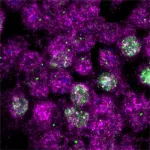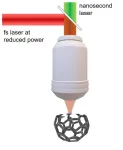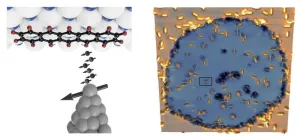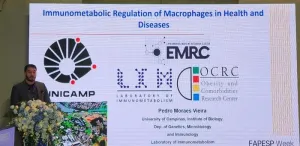(Press-News.org) SRI today announced that researchers are developing a new treatment that aims to provide a better option to fight malaria, particularly for people in low-income and rural regions. Researchers in SRI’s Pharmaceutical Sciences Lab are working on an affordable, shelf-stable anti-malarial drug formulation that could provide months of protection against the mosquito-borne disease with just a single injection, which means that individuals would no longer have to worry about missing a dose. Additionally, it has a low propensity for resistance and can be effective where drug resistance exists.
“Current malaria prevention drugs have issues — resistance, patient compliance, cost, distribution — but we have high hopes that this drug can address these obstacles,” said Gita Shankar, Senior Director of the Pharmaceutical Sciences Lab at SRI. “I dream that we can finally eradicate malaria, and I believe we’re on the path to do that.”
Typically, treatments come as pills that must be taken daily or weekly. The costs of the medication can be a burden, and people often have trouble adhering to the treatment regimen because they miss doses or take the pills at the wrong time. The World Health Organization has reported that in part due to incomplete treatments, malarial parasites in some regions have developed resistance to multiple anti-malarial drugs, making them less effective.
In a paper published in the European Journal of Pharmaceutical Sciences, Shankar and her colleagues demonstrated that their novel injectable formulation could slowly release the anti-malarial drug ELQ-331 into the bloodstream. The formulation maintained high enough concentrations of the drug to act as a long-term preventative against malaria parasites.
The part of the drug that fights off malaria parasites was designed and synthesized by Professor Michael K. Riscoe and his research team at the Portland VA Medical Center and at Oregon Health & Science University (OHSU). Riscoe’s lab received funding for this study from the U.S. Department of Veterans Affairs, National Institutes of Health, and Medicine for Malaria Venture. The OHSU team found that developing a formulation that could remain in the body for an extended period was a big challenge.
“It was basically impossible to administer and sustain its effectiveness for a long period,” Shankar said. “My group’s expertise is in targeting drugs efficiently. We developed a formulation that allowed this challenging molecule to be given in an injectable form and to be available in circulation for a sustained period.” Shankar and team developed a novel formulation that kept the drug in circulation in the body at effective levels for more than 80 days, working to prevent malaria.
The drug is not ready to be tested in humans, but efforts to scale up manufacturing and efforts to test safety and efficacy are underway. If results confirm that the drug is safe and effective, then it could move into clinical trials.
The SRI biosciences division integrates basic biomedical research with drug and diagnostics discovery, as well as preclinical and clinical development. It has advanced more than 200 drugs to clinical trials, and 25 have reached the market. The division is focused on novel platforms and programs in a variety of therapeutic areas targeting high unmet medical needs. Almost 50 years ago, SRI created one of the first anti-malarial treatments (Halofantrine) and great progress has been made against a life-threatening disease that still affects hundreds of thousands of people per year.
About SRI
SRI is an independent nonprofit research institute headquartered in Menlo Park, Calif., with a rich history of supporting government and industry. We create and deliver world-changing solutions for a safer, healthier, and more sustainable future. For more nearly 80 years, we have collaborated across technical and scientific disciplines to discover and develop groundbreaking products and technologies and bring innovations and ideas to the marketplace. Learn more at www.sri.com.
###
END
SRI is developing a new malaria treatment that aims to protect from the disease
The injectable formulation is affordable, easily administered, and could potentially provide months of protection from the potentially fatal disease.
2024-07-02
ELSE PRESS RELEASES FROM THIS DATE:
UV radiation damage leads to ribosome roadblocks, causing early skin cell death
2024-07-02
In a recent study, researchers at Johns Hopkins Medicine suggest the cell’s messenger RNA (mRNA) — the major translator and regulator of genetic material — along with a critical protein called ZAK, spur the cell’s initial response to UV radiation damage and play a critical role in whether the cell lives or dies.
While UV radiation has long been known to damage DNA, it also damages mRNA, and the latest findings, published June 5 in Cell, indicate that mRNAs act as first responders in telling the cells how to manage the stress.
“RNA is a canary in the coal mine. It’s telling the cell, ‘We’ve got major damage here and ...
Precise and less expensive 3D printing of complex, high-resolution structures
2024-07-02
WASHINGTON — Researchers have developed a new two-photon polymerization technique that uses two lasers to 3D print complex high-resolution structures. The advance could make this 3D printing process less expensive, helping it find wider use in a variety of applications.
Two-photon polymerization is an advanced additive manufacturing technique that traditionally uses femtosecond lasers to polymerize materials in a precise, 3D manner. Although this process works well for making high-resolution microstructures, it isn’t widely used in manufacturing ...
AGS member, George Kuchel, appointed to serve on ACIP
2024-07-02
The American Geriatrics Society extends its warmest congratulations to ADGAP President George Kuchel, MD, CM, FRCP on his appointment as a member expert of the Advisory Committee on Immunization Practices (ACIP). ACIP develops recommendations on the safe use of vaccines in the United States.
Dr. Kuchel, who became President of the Association of Directors of Geriatrics Academic Programs in spring 2024, is Director of both the UConn Center on Aging and the Claude D Pepper Older Americans Independence Center at the University of Connecticut. He has significant expertise and knowledge in vaccines and immunology, particularly in older adults, including performing ...
Researchers awarded Department of Defense grant to study the role of gut microbiomes to improve outcomes in dystonia
2024-07-02
Mohammad Moshahid Khan, PhD, principal investigator and associate professor in the Department of Neurology in the College of Medicine at the University of Tennessee Health Science Center, was recently awarded a $308,000 grant from the Department of Defense for a study that will investigate the role of the gut microbiome in dystonia, a movement disorder of abnormal postures and involuntary twisting or repetitive movements, to improve neurobehavioral outcomes. Jianfeng Xiao, MD, PhD, associate professor in the Department of Neurology, is the co-investigator of the study.
Although ...
Advancing toward a preventative HIV vaccine
2024-07-02
LA JOLLA, CA and NEW YORK, NY—A major challenge in developing a vaccine for HIV is that the virus mutates fast—very fast. Although a person initially becomes infected with one or a few HIV strains, the virus replicates and mutates quickly, resulting in a “swarm” of viral strains existing in a single body. But scientists at Scripps Research; IAVI; the Ragon Institute of Mass General, MIT, and Harvard; La Jolla Institute for Immunology; and additional institutions have conducted a series of preclinical ...
A Global Heat Early Warning system is now essential, and requires planning in four key areas to overcome barriers and enable successful implementation, per new review
2024-07-02
A Global Heat Early Warning system is now essential, and requires planning in four key areas to overcome barriers and enable successful implementation, per new review.
####
Article URL: https://journals.plos.org/climate/article?id=10.1371/journal.pclm.0000437
Article Title: Preventing heat-related deaths: The urgent need for a global early warning system for heat
Author Countries: Austria, Denmark, Sweden, Switzerland, US
Funding: CB,IMO, CG and JT are funded by Horizon Europe through the HIGH horizon project funded by the European Union’s Horizon Europe Programme (grant number 101057843). IMO and CG are also ...
An alternative way to manipulate quantum states
2024-07-02
Electrons have an intrinsic angular momentum, the so-called spin, which means that they can align themselves along a magnetic field, much like a compass needle. In addition to the electric charge of electrons, which determines their behaviour in electronic circuits, their spin is increasingly used for storing and processing data. Already now, one can buy MRAM memory elements (magnetic random access memories), in which information is stored in very small but still classical magnets – that is, ...
Study reveals new factor associated with the risk of severe COVID-19 in people with obesity
2024-07-02
Already at the beginning of the COVID-19 pandemic, a group of Brazilian researchers pioneered in showing why SARS-CoV-2 infection tends to be more severe in diabetic patients. Now, the same team based at the Institute of Biology of the State University of Campinas (IB-UNICAMP) has discovered one of the reasons why obese people who do not have diabetes or even insulin resistance also have an increased risk of developing the severe form of the disease.
“New experiments show that the molecular mechanisms are quite different in the two cases,” Pedro Moraes-Vieira, a professor at IB-UNICAMP, who is coordinating ...
Study finds that influential people can play a valuable role in getting people to act in the best interest of society
2024-07-02
Getting individuals to act in the best interest of society can be a tricky balancing act, one that often walks a fine line between trying to convince people to act of their own volition, versus passing laws and regulations that make these actions compulsory.
In a new paper, published in the journal PNAS Nexus, SFI External Professor Stefani Crabtree (Utah State University) and Science Board Fellow Simon Levin (Princeton University), together with Colin Wren (University of Colorado, Colorado Springs) and Avinash ...
Editorial: Genomics has more to reveal
2024-07-02
“If there was any doubt, this discovery demonstrates that genomics, extensively deployed over the past two decades, still has much to reveal to us.”
BUFFALO, NY- July 2, 2024 – A new editorial paper was published in Oncotarget's Volume 15 on June 20, 2024, entitled, “Genomics has more to reveal.”
In this new editorial, researchers Laurène Fenwarth and Nicolas Duployez from the University of Lille and CHU Lille discuss molecular and cytogenetic analyses that are now used to identify mutations and structural variants defining distinct subtypes of acute myeloid leukemias (AML) ...
LAST 30 PRESS RELEASES:
Neighborhood factors may lead to increased COPD-related emergency department visits, hospitalizations
Food insecurity impacts employees’ productivity
Prenatal infection increases risk of heavy drinking later in life
‘The munchies’ are real and could benefit those with no appetite
FAU researchers discover novel bacteria in Florida’s stranded pygmy sperm whales
DEGU debuts with better AI predictions and explanations
‘Giant superatoms’ unlock a new toolbox for quantum computers
Jeonbuk National University researchers explore metal oxide electrodes as a new frontier in electrochemical microplastic detection
Cannabis: What is the profile of adults at low risk of dependence?
Medical and materials innovations of two women engineers recognized by Sony and Nature
Blood test “clocks” predict when Alzheimer’s symptoms will start
Second pregnancy uniquely alters the female brain
Study shows low-field MRI is feasible for breast screening
Nanodevice produces continuous electricity from evaporation
Call me invasive: New evidence confirms the status of the giant Asian mantis in Europe
Scientists discover a key mechanism regulating how oxytocin is released in the mouse brain
Public and patient involvement in research is a balancing act of power
Scientists discover “bacterial constipation,” a new disease caused by gut-drying bacteria
DGIST identifies “magic blueprint” for converting carbon dioxide into resources through atom-level catalyst design
COVID-19 vaccination during pregnancy may help prevent preeclampsia
Menopausal hormone therapy not linked to increased risk of death
Chronic shortage of family doctors in England, reveals BMJ analysis
Booster jabs reduce the risks of COVID-19 deaths, study finds
Screening increases survival rate for stage IV breast cancer by 60%
ACC announces inaugural fellow for the Thad and Gerry Waites Rural Cardiovascular Research Fellowship
University of Oklahoma researchers develop durable hybrid materials for faster radiation detection
Medicaid disenrollment spikes at age 19, study finds
Turning agricultural waste into advanced materials: Review highlights how torrefaction could power a sustainable carbon future
New study warns emerging pollutants in livestock and aquaculture waste may threaten ecosystems and public health
Integrated rice–aquatic farming systems may hold the key to smarter nitrogen use and lower agricultural emissions
[Press-News.org] SRI is developing a new malaria treatment that aims to protect from the diseaseThe injectable formulation is affordable, easily administered, and could potentially provide months of protection from the potentially fatal disease.






